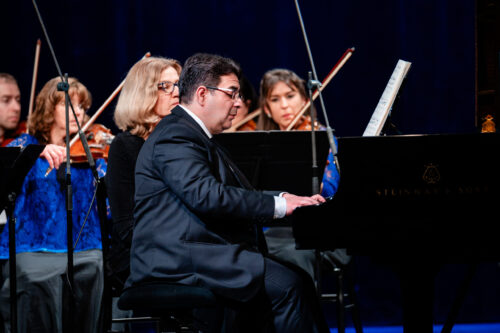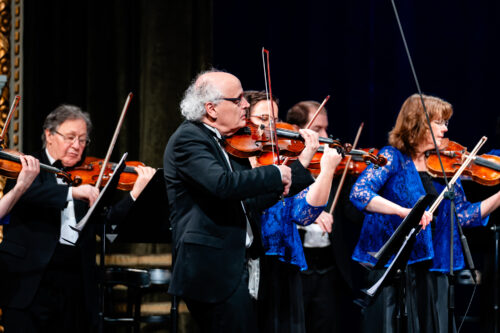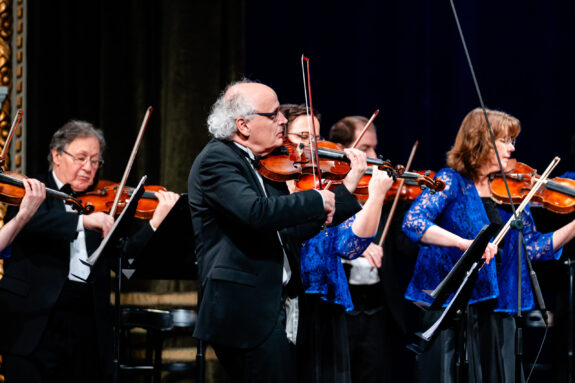 Hungary Webern, Mendelsohn, Arensky: Gábor Farkas (piano), Budapest Strings / János Pilz (leader). Solti Hall of the Music Academy, Budapest, 4.4.2025. (AK)
Hungary Webern, Mendelsohn, Arensky: Gábor Farkas (piano), Budapest Strings / János Pilz (leader). Solti Hall of the Music Academy, Budapest, 4.4.2025. (AK)

Webern – Langsamer Satz (1905)
Mendelssohn – Piano Concerto in A minor (1821-22)
Anton Arensky – Second String Quartet, Op.35 (1894, arr. for string orchestra by Arensky and Rezső Ott)
The choice of musical events in Budapest is large. I was wondering whether this concert given by the Budapest Strings with Gábor Farkas would attract a sizeable audience, as immediately next door in the big concert hall (of the Music Academy) a Mozart/Beethoven concert was presented by the Hungarian Radio Orchestra.
I cannot find accurate data about the measurements of the Solti Hall but I estimate it to be of Wigmore Hall size in all dimensions (stalls, balcony, stage). I saw a few empty seats but the audience turn out was good.
In the first half of the concert the focus was on early works of well-known composers. The opening Webern piece was nothing like what one usually associates with Webern. Intended as part of a full string quartet, Webern, then age 22, composed this movement in 1905 but put it aside and has never returned to it. The music is surprisingly romantic, perhaps because it might have been inspired by Webern’s hiking holiday which he and his then fiancé (soon to be his wife) took in the mountains.
Budapest Strings, presenting 4+4+3+3+1 players, performed the piece with their eight violinists and three viola players standing: I am not sure why, as string quartet ensembles usually perform sitting. However, the performance did full justice to Webern’s early romanticism.
Completed at the age of 13, Mendelssohn’s Piano Concerto in A minor is rarely played, possibly because of the technical demands it places on the soloist. Yet it is full of lovely melodies, more than worth listening to. Pianist Gábor Farkas delivered a virtuoso and highly spirited performance with technical demands at ease, sensitivity to the melodic interludes and humour for the charming theme plus variations in the third movement.
Composed in 1894, Arensky’s Second String Quartet was dedicated ‘to the memory of Tchaikovsky’, with its middle movement consisting of seven variations on a song by Tchaikovsky, ‘Legend’, from 16 Songs for Children, Op.54. The other movements contain psalm melodies as well as the famous Russian folk tune which appears in Beethoven’s ‘Razumovsky’ Quartet (Op.59, No.2) and in Mussorgsky’s opera Boris Godunov (coronation scene).
Arensky scored his quartet for violin, viola, and two cellos but later arranged it for the standard string quartet scoring of two violins, viola, and one cello. He also arranged the above mentioned middle movement for string orchestra, so I assume that Rezső Ott made the orchestra arrangement for the other movements.

Under the direction of János Pilz, the ensemble gave a heart-warming performance of Arensky’s work. Cantilena sections as well as virtuoso passages were delivered with discipline and dedication.
Most appropriately, their encore was the second movement (Andante cantabile) of Tchaikovsky’s String Quartet in D. They played it lovingly, caring for every note and the sentiment of the Russian folk melody which Tchaikovsky used in this movement.
Artistic integrity, as well as musicality, was a major feature of this concert. János Pilz is a very experienced violinist and led all pieces with consummate skills as well as with respect for compositions and performers alike. His team work with the disciplined, highly accomplished pianist Gábor Farkas was exemplary.
Agnes Kory
